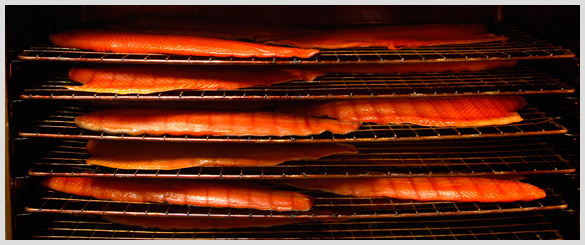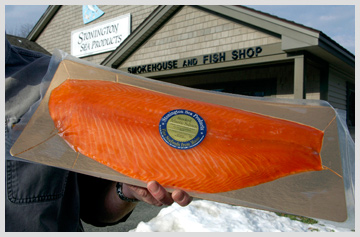
Salmon is smoked on racks at Stonington Sea Products in Stonington, Maine.
The business features smoked salmon and other smoked seafood.
Photo by Fred J. Field
Life in downeast Maine once revolved around Atlantic salmon. Ocean pens where the fish were raised dotted bays and inlets. Locally farmed salmon – the Pine Tree State’s top seafood export after lobster – was trumpeted on menus at inns and restaurants. Widespread aquaculture even spawned an annual salmon festival still held over Labor Day weekend in Eastport.
Disease, the threat of farmed fish escaping and mingling with endangered wild salmon in Maine rivers, closer and costlier environmental monitoring and other factors caused Maine’s aquaculture industry to crash within the past decade. The few surviving companies were ordered to leave nearly half of their ocean sites fallow for two years. Hundreds of Mainers were laid off in the shakeup.

photo by Fred J. Field
An outgrowth of Mane’s salmon boom, though, has survived and is thriving. The state’s half-dozen seafood smokehouses turned to New Brunswick for Atlantic salmon and have continued to refine and expand their smoked seafood line. Scattered from downtown Portland to far-flung Perry in Washington County, the smokehouses are either on or easily reached from US Route 1. The proprietors, ranging from a long-time chef to a former Outward Bound instructor, are all passionate and savvy about fish. They are friendly, adventurous folks who take pride and delight in showing their operations and explain the difference between cold-smoked and hot-roasted salmon, among other fine points.
Whether it’s downeast builder John Constant, whose tiny smokehouse sits beside his backwoods home adorned with deer racks [which is adorned? the home or the smokehouse?] or Browne Trading Co.’s “boutique” smokehouse in Portland, which supplies New York chef Daniel Boulud, all the Maine smokehouses produce cold- and hot-smoked salmon. Some import and smoke wild-caught or organically raised fish. Each has its own signature products ranging from smoked haddock pate to garlic-and-pepper salmon kabobs.
At each smokehouse, curing and smoking techniques differ somewhat. All hand-rub the fish, usually with a mixture of salt and brown sugar as part of the preliminary curing process. Some don’t add any sugar at all. Some use unrefined sea salt. They say the chunky crystals are subtler in taste and bring out the species’ unique flavor. Once a natural brine has formed, the fillets are thoroughly rinsed and smoked in small kilns. The blend of hardwood and fruitwood used for smoking varies from hickory to cherry.
Christopher Kimball, founder and editor of *Cooks Illustrated magazine in Brookline, Massachusetts, has conducted taste tests of various smoked salmon brands in past years.
Kimball encourages consumers to trust their own tastebuds and not to be too swept away by the producers’ descriptive prose or pretty packaging. “It’s like coffee growers,” he mused. “They can talk on and on about how they harvest high-mountain beans in the full moon and walk around clockwise.”
He says good smoked salmon really comes down to personal taste. Some people, he notes, prefer smoked seafood highly seasoned and thoroughly cooked like jerky while others seek the raw, fresh taste of cold-smoked fish. Herewith, a run-down of some coastal smokehouses.
Bold Coast Smokehouse
Route 189, Lubec, Maine
888-733-007,
vinny@boldcoastsmokehouse.com
www.boldcoastsmokehouse.com
Price range (shipping not included): Side of cold-smoked salmon (2 ¼ pound, sliced) $65, six-pack of garlic-and-pepper salmon kabobs $30.
Hours: Open year-round, Monday-Friday. Call ahead to visit and get a tour.
Capt. Vinny Gartmayer is usually on hand to greet folks and show them around his smokehouse that adjoins an 1862 moss-green Cape with lace-curtain-clad windows. Before moving to the easternmost town in the United States, Gartmayer ran a deep-sea fishing boat from Montauk, New York, taking sport fishermen out to catch bluefish and striped bass. He grew up on Long Island Sound, and learned how to preserve seafood from his grandfather who smoked eels in a barrel.
“If we didn’t have any charters, we’d fish for the Fulton Fish Market. If the price was depressed, you’d wind up with all these fish,” recalls Gartmayer who smoked tuna, marlin, halibut, porgies and whitefish in a home-built smoker.
On the outskirts of Lubec, Gartmayer and crew smoke a variety of seafood from farm-raised Atlantic salmon to halibut and red snapper. Signature products include smoked salmon kabobs, some of which are seasoned with garlic and pepper and are in demand at the annual Eastport Salmon Festival in September smoked mussels with basil, and smoked salmon and trout patés.
In his small retail shop, Gartmayer proudly shows a framed personal note from the illustrious French chef Julia Child who sampled his cold-smoked salmon at her 90th birthday bash in Maine. His products were also served at the 2005 Congressional Fish Fry in Washington, D.C.
Browne Trading Company
Merrill’s Wharf, 260 Commercial St., Portland
207-775-7560, 800-944-7848
Prices (shipping not included): Citrus Basil Smoked Salmon (1 pound, presliced) $45, Scotch-Cured Smoked Salmon (1 pound, presliced) $45.
Hours: Monday-Saturday, 10 a.m.-6:30 p.m.
Rod Browne Mitchell is best known among chefs and epicures as the exclusive distributor of Astara Iranian caviar and a purveyor of fine, fresh seafood from Dover sole to yellowtail tuna. He credits French chef Jean-Louis Palladin, founder of the Watergate restaurant, for helping him get started in the caviar import business. He supplies Caspian, Black Sea and American caviars to Daniel Boulud of Daniel’s restaurant and Eric Ripert of Le Bernardin restaurant in New York and other top chefs.
But the marine biologist by education, whose maternal relatives traded fish and caviar for generations from Maine, has also applied his exacting palate and standards to smoking seafood. He started out cold-smoking Scottish salmon for Chef Daniel and has since expanded his offerings to range from smoked sable fish to sea scallops. At Browne Trading, housed in a turn-of-the-century brick building, the “boutique” smokehouse uses only the freshest seafood and all the fish is cut and boned on the premises. The cold-smoked Scottish salmon, cured with French sea salt without any sugar, has been singled out by *The New York Times and *Wall St. Journal. Citrus Basil Smoked Salmon, which combines vodka and fresh basil with lime, lemon and orange zest, is among the unique products.
“It’s an all-natural smoked salmon,” Mitchell said.
Grindstone Neck of Maine
Route 186, Winter Harbor, Maine
866-831-8734, 207-963-7347
www.grindstoneneck.com
Price range (shipping not included): Cold-smoked, wild sockeye (1 pound) $36.
Hours: Open year-round, Monday-Friday, 9-5 p.m.
Five minutes from Acadia National Park’s wildly beautiful Schoodic Peninsula, Grindstone Neck of Maine takes particular pride in its cold-smoked, wild sockeye salmon imported from Alaska and cold-smoked salmon farmed organically in Scotland’s Shetland Islands. Longtime chef and co-founder Carl Johnson developed the savory products. Specialties include hot-roasted wild salmon cured in wild Maine blueberry honey, smoked crab claws and, believe it or not, wild smoked salmon candy.
Johnson doesn’t use any sugar to cure his cold-smoked salmon, which was served at Governor John Baldacci’s inaugural ball.
“They didn’t [use sugar] in the old days,” he noted. “Our salmon – because of our sourcing – doesn’t require any sweetener.”
Maine-ly Smoked Salmon Co.
555 South Meadow Rd., Perry, Maine
207-853-4794
www.mainelysmokedsalmon.com
Prices (shipping included): Cold-smoked salmon (2-pound fillet) $15.50, hot-smoked salmon sticks (1 pound) $14.
Hours: Open year-round, but call ahead to pay a visit.
Two miles from U.S. Route 1, Maine-ly Smoked Salmon is a one-man operation. John Constant, who managed a large salmon farm for 18 years, started smoking freshly harvested Atlantic salmon as a sideline years ago. He now builds houses full-time, but has continued to develop his smokehouse. He smokes only what he knows best: Atlantic salmon raised in Cobscook Bay. His spicy hot-smoked salmon sticks – brined in a blend of salt, brown sugar, citrus, chopped onion, and bay leaves – are always a hit at the Eastport Salmon Festival and have been featured at The Big E (Eastern States Exposition) in West Springfield, Massachusetts. He has managed to keep his prices astonishingly low through elimination of fancy packaging and promotional material. “We keep our prices low so we can find our niche,” explained Constant who has a local following. “We are at the end of the earth here and can’t charge $30 per pound.”
Stonington Seafood Products
Route 15, Stonington, Maine
888-402-2729, 207-367-2400
www.stoningtonseafood.com
Prices (shipping included): Cold-smoked salmon (sliced 2¼ -pound fillet) $64, 1 pound smoked finnan haddie $22.
Hours: Open year-round, Monday-Friday, 10 a.m.-5 p.m.; Saturdays 10 a.m.-2 p.m.
An Englishman who once raised trout in Great Britain, general manager Richard Penfold knows fish. He holds a fisheries science degree. He worked as a fisheries extension service educator in the South Pacific Islands of Vanuatu. He taught seafood filleting and smoking at North Atlantic Fisheries College in Scotland’s Shetland Islands before he and his American wife moved to this isolated Maine fishing town.
Speaking with a soft burr, Penfold declares, “The fish are everything” when he’s talking about the raw material for his smoked product line. He goes to great lengths to find the freshest seafood along the Eastern Seaboard whether it’s Atlantic salmon from Canada’s Bay of Fundy, hook-caught wild haddock from a Massachusetts fisherman, or rope-cultured mussels from Blue Hill Bay in Maine.
In addition, he uses a slow-smoking kiln imported from Glasgow, Scotland. The seafood is cured with a subtly flavored sea salt harvested in Haiti. No sugar is added.
Penfold’s tireless pursuit of prime seafood and meticulous quality control are paying off. In The Rosengarten Report in 2005, David Rosengarten proclaimed the cold-smoked salmon “the best I’ve ever tasted that wasn’t raised or smoked in Scotland” after sampling dozens of smoked salmon brands.
Sullivan Harbor Farm Smokehouse
US Route 1, hancock, Maine
800-422-4014
www.sullivanharborfarm.com
Prices (shipping not included): Cold-smoked salmon (sliced, 2 ¼-pound fillet) $52.
Hours: Open year-round, Monday-Saturday, 9 a.m.-5 p.m.
This smokehouses invites the eye and palate. The new, shell-pink building resembles a cake on a pedestal. Triangular windows dominate the second story. Tongue-and-groove boards accent soffited eaves. Powder-blue crown molding traces mullioned windows. Cedar shingles rimmed in a wave pattern skirt the façade and gable ends. No detail was overlooked or expense spared to highlight the product line featuring Atlantic salmon, rainbow trout and Arctic char. Smoked scallops and smoked salmon pate are also available.
“This is a fish factory and yet no one would know it,” proprietor Joel Frantzman, a former Outward Bound instructor, mused. “I think of this place as old wine in a new bottle.”
When Sullivan Harbor Farm started smoking seafood more than a decade ago, the company landed a blue ribbon for its cold-smoked salmon from *Cook’s Illustrated magazine and an order to supply the Legal Sea Food restaurant chain.
Smokehouse and fish terms
Farm-raised salmon: Fish raised in floating cages and fed commercial feed containing ground shrimp shells to produce the pink color.
Cold-smoke: Barely cooked. Has the texture of cured ham. Can be sliced thin without crumbling.
Hot-smoked salmon: The color has faded in the smoking process. The chunky, pale-pink flesh crumbles when sliced.
Lox: Salt-and-sugar cured salmon.
Gravlax: Salmon cured with a mixture of salt and sugar, fresh dill and crushed peppercorns and refrigerated for at least 48 hours.
 Salmon is smoked on racks at Stonington Sea Products in Stonington, Maine.
Salmon is smoked on racks at Stonington Sea Products in Stonington, Maine. photo by Fred J. Field
photo by Fred J. Field Salmon is smoked on racks at Stonington Sea Products in Stonington, Maine.
Salmon is smoked on racks at Stonington Sea Products in Stonington, Maine. photo by Fred J. Field
photo by Fred J. Field